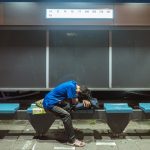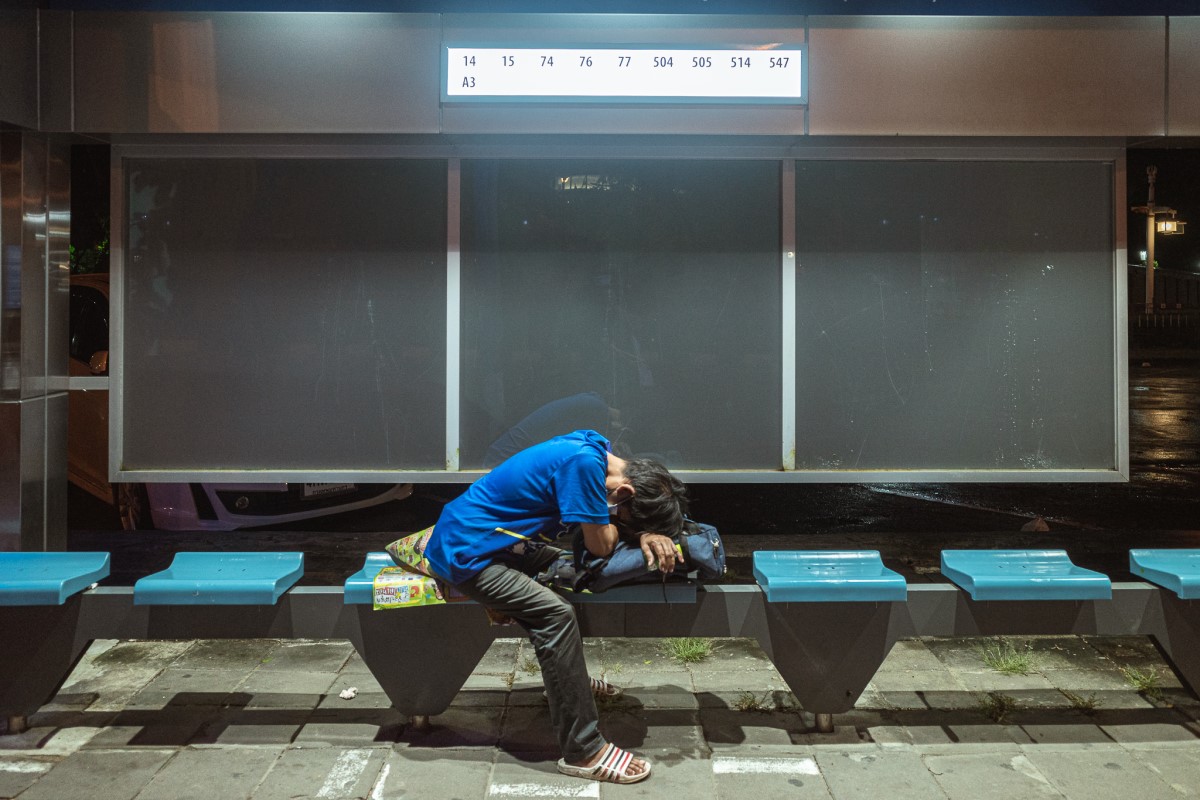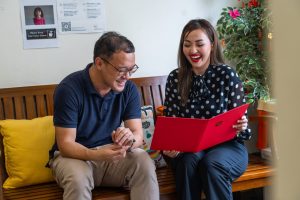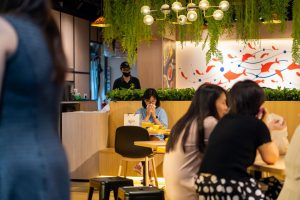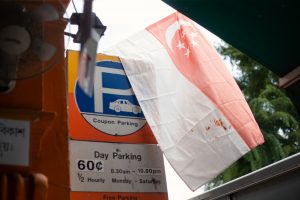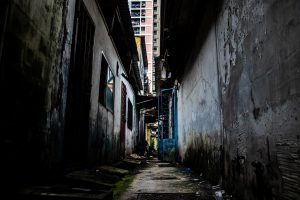All images: Phobthum Yingpaiboonsuk & Worranit Kiatcharatchot
Translated by: Wil Hathaway
THAILAND — Homelessness has plagued Thai society ever since I can remember. Now that I’m older, I’m beginning to recognise an invisible hand that keeps these unfortunate souls oppressed. It’s a vicious cycle. Once you’re on the street, there’s very little you can do to get back on your feet.
The seemingly eternal pandemic of COVID-19 has crippled global economies, put countless people into hospitals and driven many more into destitution. If you have been out and about in Bangkok this past year, you must have noticed a substantial increase in the number of individuals seeking refuge on the streets.
ADVERTISEMENT
Sometimes they’re passed-out drunk or just napping—it’s hard to tell. Other times they’re wheeling their make-shift cart, collecting garbage. And often, you can find them queueing up for free food donated by private citizens.
Sure, you’ve seen them on occasions pre-pandemic, but now they are everywhere. You run into them more often, and their clusters appear larger than ever. If you pay close attention, you’d have surely noticed a lot of new faces. My theory? COVID has driven them out of their jobs, out of their homes, and onto the streets.
Ratchadamnoen Boulevard—a stone’s throw away from backpackers’ paradise, Khaosan Road, and the Grand Palace, an iconic symbol of Bangkok’s prosperity—is home to more homeless people than I can count. On this scorching hot day, I have noticed more of them than I’ve ever seen before, lounging about, hiding from the infernal tropical sunshine in the shades of a tree or a nearby abandoned building defaced liberally with graffiti.
The name Ratchadamnoen roughly translates to the king’s road, but there’s nothing kingly about the sight I am now bearing witness.
Making acquaintances
I lay down my piece of a cardboard box cut-out next to an elderly street dweller, apprehensive, albeit entirely prematurely. It turns out he’s pretty friendly and enthusiastic about sharing street-living tips and tricks.
“Where can I get something to eat?” I ask.
He points and indicates that I should go across to the other side of the boulevard, where more homeless street inhabitants are congregating. He explains that free food is usually distributed over on that side, and if I wait over there, I will soon get some sustenance to get me through another day of living on the streets.
“I’ve actually eaten today,” he adds. “Besides, I don’t want to catch COVID.”
His top tip of the day is to maintain a distance for the time being while remaining vigilant, and as soon as I can spot a vehicle bearing food, one that stops next to the pavement on purpose, I should make a run for it so I can be at the front of the line.
“Don’t be shy, or you’ll go hungry,” he emphasised.
I thank him for his wise words and make my way to the other side.
As I cross the boulevard, I’m making a mental note about the daily activities that I have observed. Besides trying to get the next meal, I don’t think there’s much else for the homeless to do except sleep, idly chat or collect recyclables. It’s not an eventful lifestyle. No wonder they seem to like drinking lao khao, a distilled rice liquor that’s probably strong enough to strip paint. It’s the one thing they can afford to do for any form of happiness.
ADVERTISEMENT
The boulevard of broken dreams
On this side of the boulevard, I find myself sprawled out next to Tik and strike up a conversation with her. So far, I’ve learned that she used to clean hotel rooms for a living until COVID forced her employer to shut down—at least for the time being. Tik remains optimistic that she will soon be able to work again, not because cleaning is her passion, but because it’s a means to an end. It’s how she earns a living.
Tik used to live a more comfortable life. She reaches into her tote and fishes out a stack of faded photographs wrapped in a plastic bag. They are her reminders of a better day and tokens of the memories she cherishes.
“If my husband were still alive, I wouldn’t have to be here,” she remarks bitterly as she scans her surroundings for signs of free food before carefully putting her prized memorabilia away.
“I’m a local gal. I grew up in this neighbourhood, and I have always worked around these parts,” she recounts.
It seems unfair that she has to rely on the kindness of others just to get by. This should be a public concern, yet these homeless street dwellers rely on private donations. We continue chatting for a while until everyone’s head suddenly turns towards an approaching truck, bearing what will be many of their next meals.
“This is good. There are eggs,” Tik beams and even gives me three of her hardboiled eggs. I politely declined since I was quick enough to get some myself.
Earlier I was worried that I wouldn’t fit in or that my cover would be blown. Tik offering me her share of ration is a clear sign that I fit right in.
Food in hand, I bid Tik farewell and wander off.
Since I haven’t made up my mind about my next destination, I sit down on one of those giant plant pots that double as benches. I haven’t even caught my breath yet when one of the street cleaners yells at me for getting in his way. I jump up and shy away.
I’ve never been yelled at by any government employee, not until now. I reckon it’s probably a common occurrence for many of my new acquaintances without a home. It pains me to think about how badly the transient is usually treated, but I also somehow sympathise with the cleaners. The more homeless people on the streets, the more mess they have to clean up.
Streetlife by choice
Some people who live on the streets are homeless. Some, like K, would rather not go home—they are homeless by choice.
K could technically go home and live with his ailing mother, but he would rather avoid listening to another sermon about how useless he is to the family. Sadly, this is what happens when you have a house but not a home.
K’s current predicament is his missing national identification card which is not actually missing. It’s simply being held.
Previously, K cinched a manual labour job on a pineapple plantation through an agent. Expenses were involved, and the agent footed the bills. To ensure that K would pay it back, the agent held on to K.s I.D. card. The job and living conditions proved to be more than K was comfortable with, so he fled. Can you blame him, though? Farming isn’t easy to begin with. If you had to do manual labour in this heat, you’d bail, too.
To wit, he doesn’t have his I.D. card, and without it, he can’t get another job. Right around when the pandemic hit, K was actually about to start working for a local wealthy man he knows, but his position has since been suspended indefinitely.
“Mum thinks I’m a drunk. I only do a couple of shots a day, no more than 20 baht. You want some?” he offers a bottle of clear liquid which I politely decline.
“I know I’m just sitting here, idling, but my head is spinning,” he claims.
To be honest, I’m not sure whether his head is spinning because he’s got a million thoughts racing through or if it’s the lao khoa he’s been drinking or potentially both.
I hand him my bag of eggs. He grabs one and gives the rest back to me.
“I’ve already had something to eat today,” he mutters.
Another lesson learned
I make my way to Lumpini Park. Many street side benches are already occupied by homeless street residents ready to settle in for the night. Here, I met Yak, sitting on a bench, dressed simply in shorts, a t-shirt, and a black fanny pack around his waist.
Previously I bought two sets of sticky rice with chicken, two cans of soft drink, and two bottles of water. I offer one of each to Yak, intending to win a new friend over with food. Yak gladly accepts the offer, takes one bite of the sticky rice, and puts the rest away neatly inside a plastic container. He’s drinking the soda, though.
I, on the other hand, am tucking in like I haven’t eaten in days.
“You have to plan for your next meals. I already had some food earlier. So I’m good. Now I know I’ll have something for tomorrow,” Yak explains.
He then proceeded to show me a bag of sticky rice and some sauce that was his meal earlier. I feel quite awkward asking him all these questions while I’m eating. My plan was to eat and chat as friends do at dinner. I hadn’t taken into account that this is a different lifestyle.
I learned that Yak used to sell tea in Lumpini Park, but the park has since shut down because of COVID, and he’s been unemployed ever since. Yak has been living out in the open for about half a month now. He’s rolling cigarettes as we talk and offers one to me, which I accept out of sheer courtesy.
“We share, you know?” he says. After we’re done, Yak puts the butts away in one of his garbage bags along with his can of soda.
“I’ll throw this out tomorrow. As long as you don’t litter or trouble anyone, they leave you be,” he explains.
“You’ve been at this for a while. Are you used to it?” I ask.
“I don’t want to be used to it. I don’t want this to be part of my daily life,” Yak responds. He adds that no one wants to just ask for money. It’s not an easy life being homeless. Everyone wants to be gainfully employed.
Yak has tried to find another job. He got one: as a dishwasher. Unfortunately, his joint pain, which requires medication, doesn’t allow him to cope with the demand of the position. He shows me his elbow. It doesn’t look right.
“It’s not that I don’t want to work. I do, but my body isn’t cooperating. I really do want a job, but my body can’t handle too much manual labour. I did try. I really did,” he replies, his tone defeated.
Yak goes on to tell me that jobs are hard to come by these days. He relates a story of his friend who spent several hundred baht on some decent clothes and shoes for a job interview, which he eventually didn’t get. All that money spent and for nothing.
His anecdote reminded me of the time when I was retrenched. It was scary, but at least I had a roof over my head, my mum to make me all the food my heart desired, and the support of my family. Yak, on the other hand, has none of that. The level of fear and anxiety that comes with being both jobless and homeless is beyond my comprehension.
All I had to do was be frugal and look for a new job. Yak has to worry about his safety, health, meals and a myriad of other things that come with the territory.
I learn that Yak gets by because the locals give him food. An expat jogger also gives him 20 baht every time he passes by. To relief himself, Yak relies on the nearby hospital’s toilets. He showers right on the sidewalk late at night, when they are fewer cars on the road, with permission from whoever owns or takes care of the property.
“Don’t you have a family? Do they know about your situation?” I pry.
“I do, and of course not. I won’t trouble them with this. I am a grown man. You gotta understand. I don’t have wife, no kids. I can handle this on my own,” he declares.
Because his family doesn’t have much money, he’d rather not burden them. He plans to ride it out until the park can reopen, and he can start selling tea again, just like before.
“Are you staying here tonight? Do you mind if I just make myself comfortable down here?” I enquire. Yak looks at me, puzzled.
“If you’re sure, go ahead. It’s not comfortable, I can assure you that,” Yak answers, his expression quizzical.
I spare no time and put down my cardboard cut-out.
Yak warns me to be careful. Pickpockets in the neighbourhood don’t spare the homeless. If you have anything valuable, they will take it. That’s how Yak was greeted the first time he slept here.
I’ve decided to put all of my belongings inside my tote, tie it, and put it underneath my shirt. I think that’s my safest bet. I will also use the bottle of water as my pillow. None of this is comfortable. But before we turn in, I ask Yak to take a picture of me getting ready for “bed.”
Sleeping out in the open like this would be fine if I didn’t need to worry. I don’t have a roof over my head. I don’t have walls to shelter me from the wind or oncoming traffic. There are all kinds of annoying noises. There’s always someone or something moving about. It’s a full, surround-sound, immersive experience.
Despite all the distractions, I fall asleep in no time from today’s exhaustion, but I keep being woken up by the sound of trucks, the wind or motorbikes. I can’t help but think that this is more exhausting than staying awake. Yak, on the other hand, hasn’t even stirred.
Around 3 a.m., both Yak and I are rudely awoken by the thunders. We seek shelter from a nearby bus stop, joined by other homeless fellows. Soon, it started to pour.
“Well, there goes our sleep,” Yak mourns.
After a night on the streets, I think I understand them a little more. I know I am going home after all this. Them? Their future remains clouded, exacerbated by Bangkok’s fumes and intoxicating smog. Some think that having nothing is bad—no job, no money, no future. But after today, I’ve learned that what’s worse than having nothing is to be homeless. There’s very little way of getting out of a situation as dire as not having a roof over your head.
At daybreak, I bid Yak goodbye and went home.
Now, at every meal and each time it rains, I think about them. I hope they have somehow turned their life around.
I hope they’re doing well.

